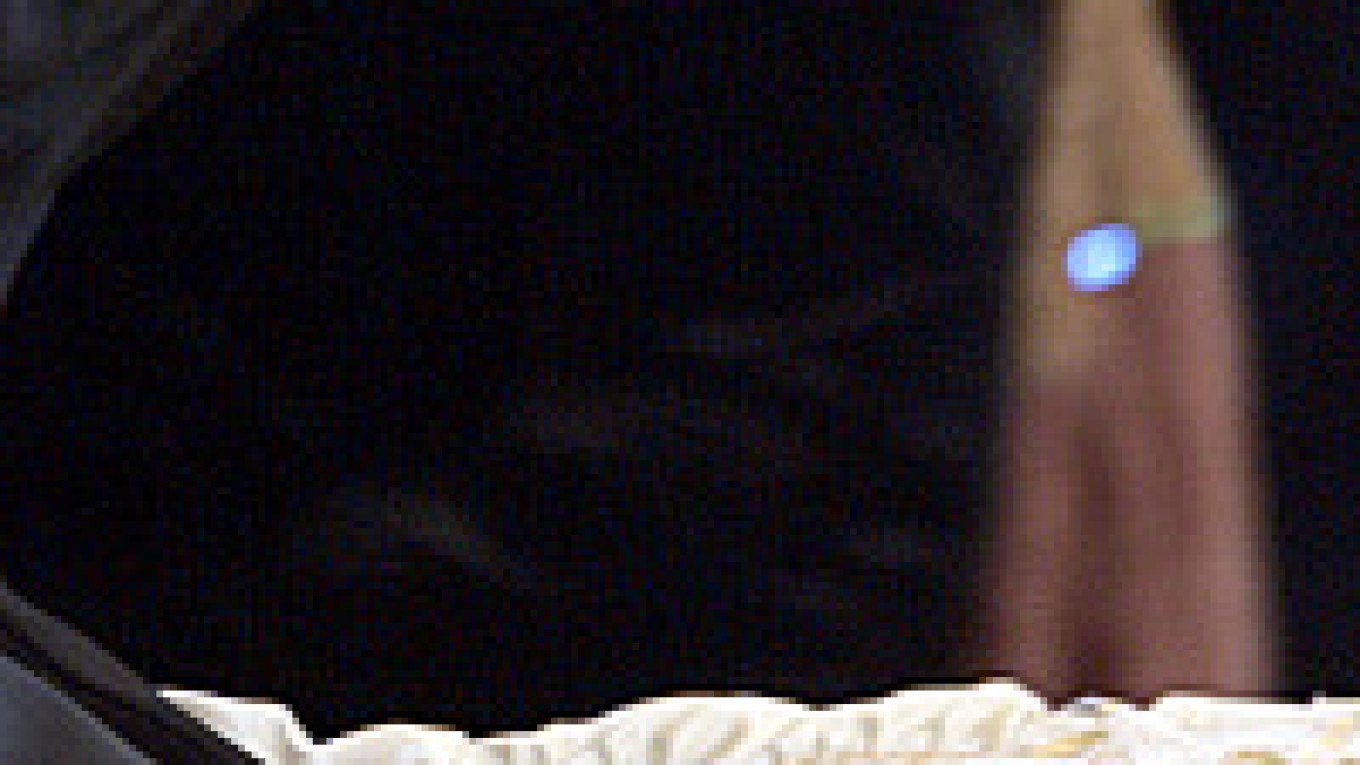Some in the crowd shouted "Bravo!" after his grave -- just meters from Boris Yeltsin's -- was covered with flowers.
Rostropovich's support for Soviet-era dissidents had caused him a painful separation from his homeland in the 1970s and '80s, but when the Berlin Wall came down in 1989, he played Bach suites in the rubble, and the following year returned triumphantly to Moscow to perform.
Rostropovich died Friday aged 80 after a long battle with intestinal cancer.
Thousands of tearful admirers of his musical talent and ebullient personality attended a Sunday morning funeral service in Christ the Savior Cathedral. At the service, red-robed Orthodox priests sang prayers and swung incense burners as mourners lit candles and laid flowers near the open casket, where the musician's body lay covered with a white cloth embroidered with a gold cross.
Rostropovich's funeral there followed within days of that of Yeltsin, the former president and a longtime friend of the cellist.
Guests and dignitaries at the service included family friends, among them Yeltsin's wife, Naina; Spain's Queen Sofia; French first lady Bernadette Chirac, and the wife of dissident writer Alexander Solzhenitsyn, Natalya.
 Denis Sinyakov / Reuters Vishnevskaya, center right, and Yeltsin flanked by Yelena, left, and Olga. | |
Rostropovich sheltered the Solzhenitsyns during the author's bitter battle with Soviet authorities in the 1970s. Also in attendance were Azeri President Ilham Aliyev and his wife. Rostropovich was born in Soviet Azerbaijan.
President Vladimir Putin, who called the musician's death "a huge loss for Russian culture" paid his respects during a civil mourning on Saturday at the Moscow Conservatory, where Rostropovich studied and played.
Archbishop Alexy, who led the prayers, read a letter from Russian Orthodox Patriarch Alexy II, which described Rostropovich as a "tireless activist, defender of human dignity, spiritual freedom and love for the Motherland."
Alexy, who did not attend the ceremony because he was undergoing medical treatment, recalled that Rostropovich initiated a charity concert to raise money to rebuild the cathedral.
After the ceremony, Rostropovich's coffin was transported to Novodevichye Cemetery, where his teachers Dmitry Shostakovich and Sergei Prokofiev are also buried. Yeltsin was buried there Wednesday.
The musician's coffin, decorated with a gold crucifix, was gently lowered into the ground. His widow, Bolshoi Opera soprano Galina Vishnevskaya, daughters Olga and Yelena and other family friends then sprinkled the casket with earth in line with Orthodox tradition. A choir of priests sang prayers of mourning. When the burial ceremony was over and the grave was decorated with a large Orthodox wooden cross and covered with dozens of wreaths and heaps of flowers, the mourners burst into applause.
"He spent all his life being in love," said Natalya Solzhenitsyn.
"He was in love with the music he played, with those who listened to him, with his loved ones, with the halls he played in. ... And in this state of love one is capable of moving mountains. And he did," Solzhenitsyn said on NTV television.
A Message from The Moscow Times:
Dear readers,
We are facing unprecedented challenges. Russia's Prosecutor General's Office has designated The Moscow Times as an "undesirable" organization, criminalizing our work and putting our staff at risk of prosecution. This follows our earlier unjust labeling as a "foreign agent."
These actions are direct attempts to silence independent journalism in Russia. The authorities claim our work "discredits the decisions of the Russian leadership." We see things differently: we strive to provide accurate, unbiased reporting on Russia.
We, the journalists of The Moscow Times, refuse to be silenced. But to continue our work, we need your help.
Your support, no matter how small, makes a world of difference. If you can, please support us monthly starting from just $2. It's quick to set up, and every contribution makes a significant impact.
By supporting The Moscow Times, you're defending open, independent journalism in the face of repression. Thank you for standing with us.
Remind me later.


